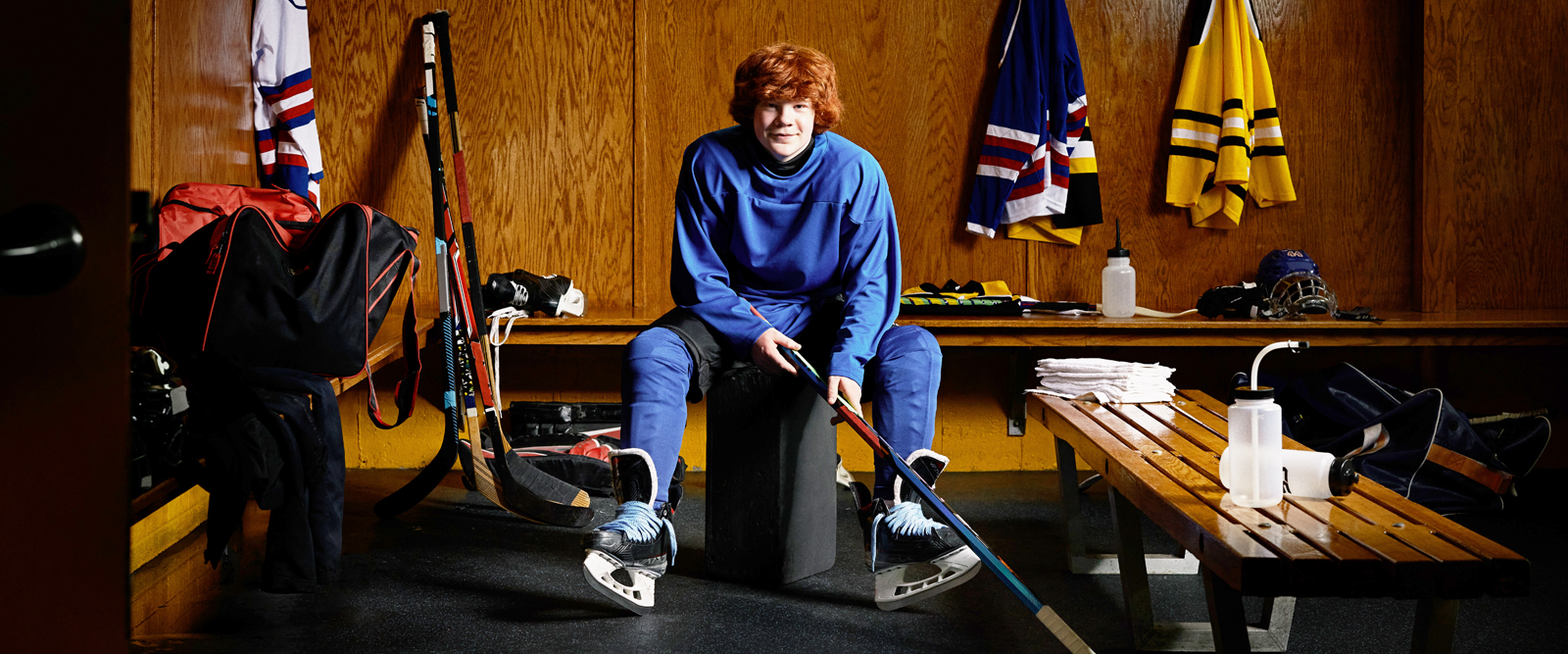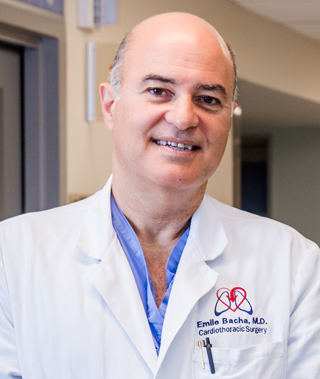Living Life With a Full Heart
Born with half a heart, Jack Foley underwent three surgeries at NewYork-Presbyterian Morgan Stanley Children’s Hospital to re-engineer how his heart pumps. Now a 12-year-old hockey player, “Super Jack” is a superstar on and off the ice.

Although it’s been nearly 10 years since the last of Jack Foley’s three surgeries to correct hypoplastic left heart syndrome (HLHS) — a rare, congenital heart defect in which the left side of the heart fails to develop — his mother, Lauren Kiefer-Foley, still becomes emotional over the thought of what Jack has gone through, which happens every time she sees him doing what he loves most — playing hockey.
“I tear up every time he gets on the ice,” Lauren, a special education teacher, says, “because to me it is such a miracle, and I don’t forget. I never take it for granted.”
Today, 12-year-old Jack is just like other kids his age. He loves sports and board games, and he recently took up chess. But one activity reigns supreme.
“He is all hockey, all day,” Lauren says. “Whether it’s ice hockey, hockey in the home or hockey outside — it’s just in his blood.”
If he could, Jack would spend all his time playing with his teammates.
“I love the friendships that I’ve made playing hockey, and staying with my friends at tournaments,” he says, “and I love the physicality” of the game.
When he was born on April 25, 2011, it seemed inconceivable that Jack would ever live such a physically active life. But thanks to his care team at NewYork-Presbyterian Morgan Stanley Children’s Hospital, he’s not just athletic — he’s thriving.
A Life-Changing Diagnosis
When Lauren was five-months pregnant, she and her husband, Rob, a federal firefighter with the Department of Veterans Affairs, were told that Jack had HLHS, a condition that very likely would result in his not meeting his developmental milestones — and put his life at risk. Several physicians painted a grim picture, but, providentially, a family doctor suggested they meet Dr. Emile A. Bacha, chief of the Division of Cardiac, Thoracic, and Vascular Surgery at NewYork-Presbyterian/Columbia University Irving Medical Center.

Dr. Emile Bacha
“He didn’t promise us the sun, the moon and the stars,” Lauren recalls of those early days, “but he told us that there was hope. Those were his exact words, and that’s all we needed to hear.”
But it took more than hope to get through those difficult first years — it took courage from Lauren, Rob and Jack, too.
“I’m not going to lie, I was very scared that entire time,” Lauren recalls, “but I remember telling Jack that he was strong, just like his uncle Michael, my brother (a firefighter who was killed in 9/11). And that was what we kept telling him, that he’s strong and can do all these amazing things.”
A Long and Complex Road
Dr. Bacha, who sees about 20 to 40 HLHS cases a year, had reason to be positive about Jack’s chances. As a pioneer in developing advanced, minimally invasive techniques for correcting congenital heart defects, he was confident that he could help Jack, who underwent his first surgery just four days after his birth.
“When somebody is born with HLHS, it means that they’re basically missing the left side of the heart,” says Dr. Bacha, “so we have to re-engineer and do some plumbing to make it so that the right side of the heart is doing the work of what normally the left side does. That takes a lot of stitching of vessels in the various places.”
The first step is the Norwood procedure, during which Dr. Bacha reconstructed Jack’s aortic arch and placed a shunt in Jack’s heart to keep it open for blood flow.
“[Norwood] is not something that is long term,” Dr. Bacha says. “It’s just a palliative procedure. But without any surgery, HLHS is uniformly fatal.”

Baby Jack after his second surgery.
The Norwood operation enabled Jack to survive until his body was ready for the next step, at age six months, “when we did some more plumbing to take out the artificial shunt and use his own vessels to provide blood flow to the lungs ,” says Dr. Bacha.
Finally, at 2½, Jack was ready for the final procedure, known as Fontan, during which Dr. Bacha used an artificial artery to complete circulation throughout the body.
“Why can’t you do everything in one operation?” Dr. Bacha asks, rhetorically. “Because a baby is very small when they’re born and there’s only a limited amount of operating that their body, physiologically, can tolerate. You do the first operation, then you wait and let them recover. You do the second one at six months, then let them recover, let them grow. The third one is where we have to use an artificial artery — an artificial vessel. We really want them to be a little bit bigger so we can upsize that vessel. That’s why we wait until they’re two to three years old.”
The skill and care with which Dr. Bacha operated on Jack still resonates with the Foleys.
“Every time I think of [Dr. Bacha], I tear up because that’s the man who held our son’s heart in his hands,” says Lauren, “and helped give him the life he has today.”

Jack, now age 12, with Dr. Emile Bacha
A Grateful Family
The strength and resilience that Jack exhibited through his surgeries earned him the nickname “Super Jack” from his NewYork-Presbyterian care team, a name that Jack loves and says has stuck.
“I think they were supercool to think of that,” he says. “Like Superman, we’re both strong. He’s fearless. I’m fearless … I love my nickname.”
Lauren shares her son’s sentiments and adds, “He’s a funny kid. Once he warms up to you and feels comfortable, he’s got such a quick wit and great comedic timing. He’s just a fun, lovable kid to be around.”
And although he had a challenging start to life, Lauren doesn’t worry too much about his future.
“I only wish for Jack what I call the three H’s,” she says, “to be happy, healthy and honest.” And, as he grows up, the Foleys celebrate each milestone in his life, including his “heartaversaries,” which they commemorate every year to observe the dates of each of Jack’s three surgeries.
“It’s a rebirth in a way,” Lauren says. “It’s another birthday.”
On those days the Foleys place “a lot of hearts outside our house” on Long Island, and they celebrate Dr. Bacha, too, and keep him apprised of Jack’s progress via Facebook.
“It’s very important to my husband and me to keep Dr. Bacha in our home, in our daily lives, because he is such a big part of our family. I think it’s important to let him know of all the wonderful things that Jack has done,” she says. “It’s my way of saying thank you. Dr. Bacha’s care and his skill are by far the absolute best. And I believe that his compassion and the love that he shows for his patients and their families plays a big part in that.”
Jack shares his mother’s gratitude.
“Dr. Bacha means everything to me,” Jack says. “I’m so happy that he was so skilled to help me and that I can do what every typical 12-year-old kid can do … he means the world to me. I’m so grateful for him.”
“Not only did Dr. Bacha help Jack,” Lauren adds, “he helped my husband and me, too … he has, no pun intended, an amazing heart.”




